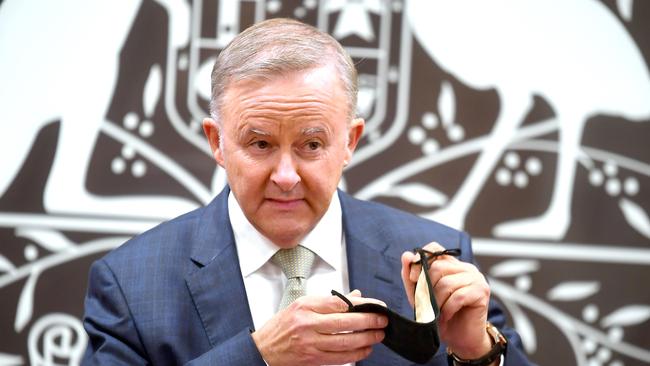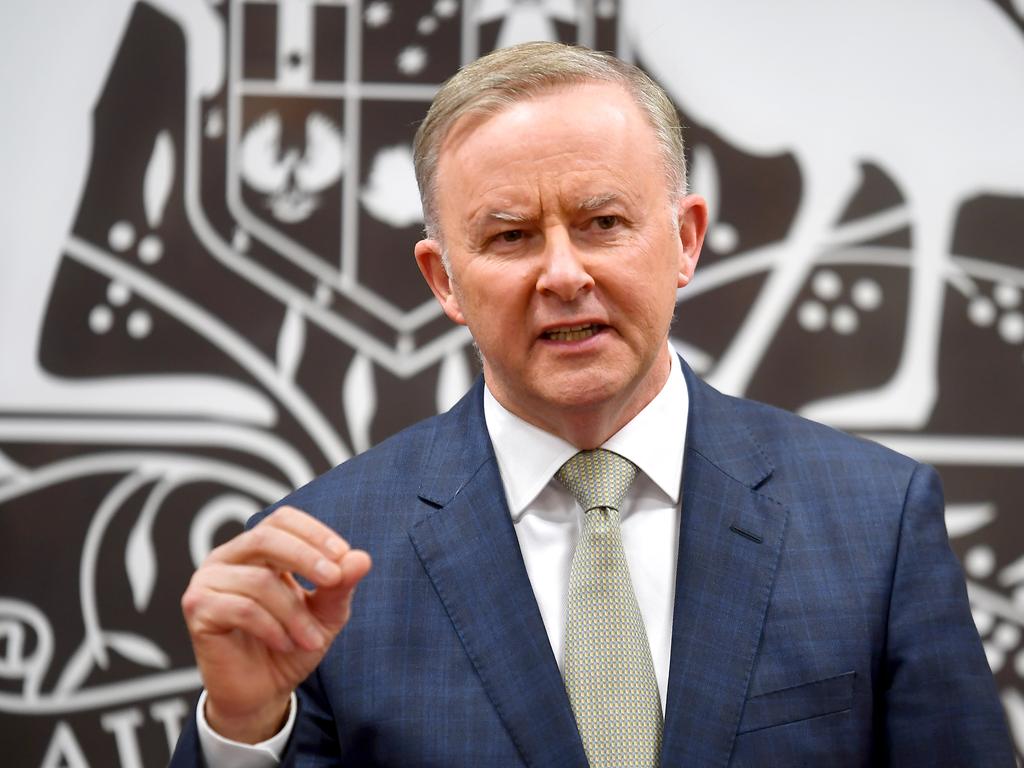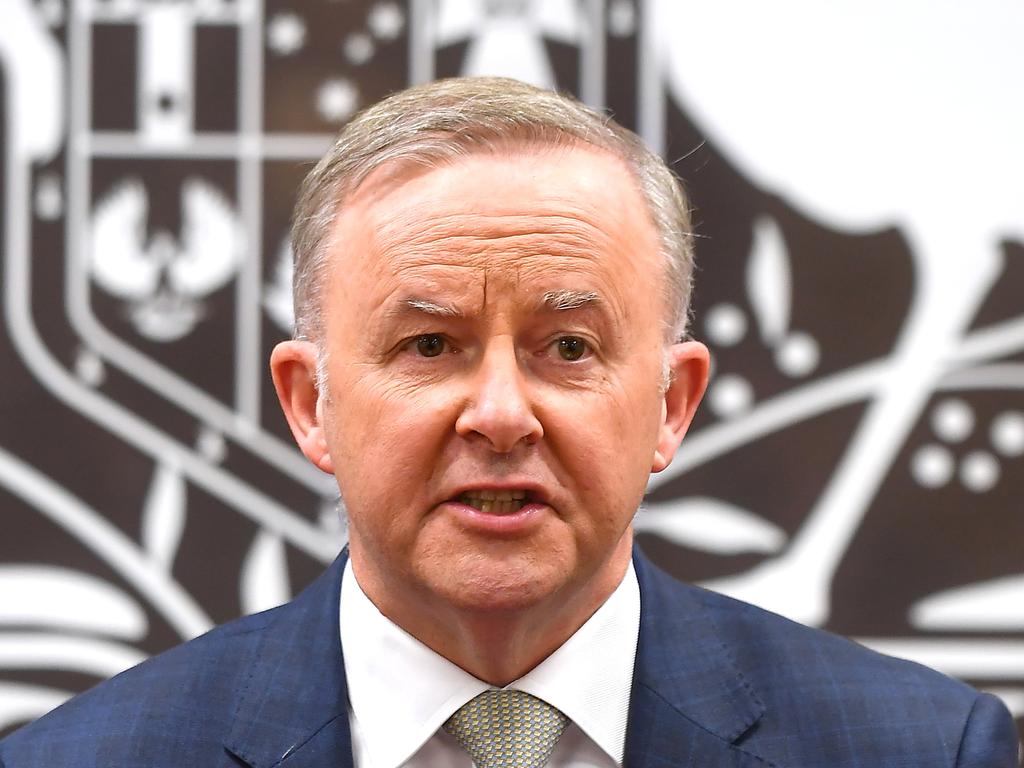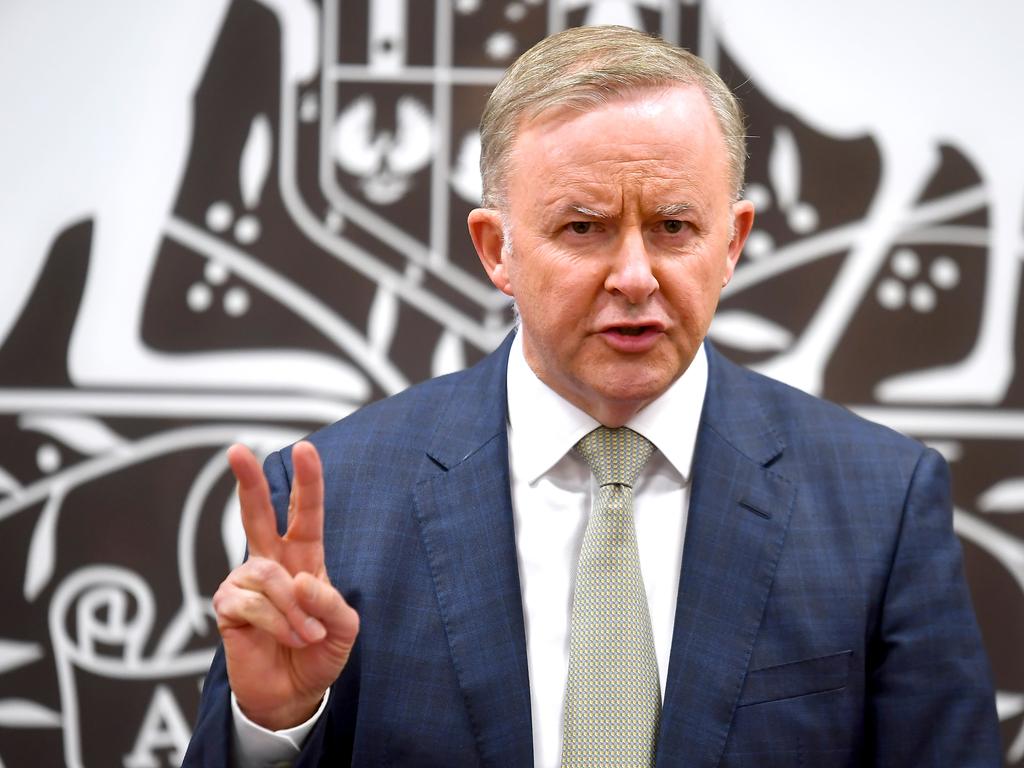
It is not before time. Formal repudiation of the tax policies and political strategy Bill Shorten took to the 2019 poll reveals a party desperate to win the next election. There is a smell of “whatever it takes” about this reversal. The message is Labor’s purpose is to govern, not represent 33 per cent of the public.
It is a landmark event with two certainties – it makes Labor a significantly more formidable competitor at next year’s election and it makes the consequences of any defeat horrendous. This decision sharpens the pivotal issue of national politics – will the Covid Delta strand plunge Australia into a double recession, terminate the Morrison government and trigger a return to Labor government? The pandemic, however, is a beast full of surprises. Labor’s tax decision is benefited by the pandemic but is not driven by the pandemic.
Throughout his career there have been two sides to Albanese – an ideological warrior of the Left and an astute grassroots reader of mainstream opinion. As a leader he has been underestimated, as was Scott Morrison before the 2019 election. But Albanese is highly competitive and moving steadily to eliminate Labor’s weaknesses while exploiting Morrison’s mistakes.
This week is a watershed moment for Labor. It repudiates the party’s direction at the 2016 and 2019 elections. It repudiates much of Labor’s post-2014 brand – as a redistributive, higher tax, big-spending, business-sceptic, class-based, cluttered-policy-agenda party fuelled by a progressive conviction that Australia was moving to the left and changing its values.
Morrison won in 2019 because he saw the Australian mainstream had no stomach for radical change. It wanted reassurance, not upheaval. Blinded by arrogance, Shorten misread the times. The entire logic of Albanese’s elevation was to find a new direction against much internal and stakeholder resistance. That he came from the Left helped. Albanese’s instinct, reinforced by deputy Richard Marles, is to walk away from policies that failed at the ballot box, no matter how praiseworthy. His defining expression is he won’t “re-litigate the past”. His job is to fashion a new agenda for a pandemic-plagued country.
In strategic terms it means a move back to the political centre. In tactical terms it means denying Liberal leaders their “big scare” against Labor – the tactic Tony Abbott in 2010 and 2013 and Morrison in 2019 deployed against Labor. There are two underlying imperatives in Labor’s repositioning – recognising the power of the negative in our politics (a retrograde reality that cannot be ignored) and recognising that Labor has spent a decade on the wrong track, listening far too much to its allied interest groups and fellow travellers at the expense of the wider Australian community.
Albanese assumes a poll next year fought on the health and economic response to the pandemic. What loomed as Morrison’s strength now seems his weakness. But the story may change by next May with a vaccinated nation in a likely economic recovery. In recent weeks, Albanese has settled on his message – that Morrison failed this year on the two tasks he had: vaccination and quarantine. There is another potentially fatal message coming if Australia slips into recession, though it is too early to make this call. Josh Frydenberg admits the September quarter is likely to be negative, with the December quarter unknown. But a double-dip recession would undermine the Liberals on their winning issue of economic management.
Surviving periodic leadership rumblings, Albanese has negotiated his way to leadership authority by securing a decisive repositioning of the party. The price paid seems high: accepting the government’s stage three personal income tax cuts with its Liberal Party philosophy to ensure 95 per cent of taxpayers face a marginal rate of no more than 30 per cent and delivering gains across most of the income range.
Opposition Treasury spokesman Jim Chalmers had attacked stage three as the least responsible, affordable or fair. It is now Labor policy. The clinching point is that these tax cuts have passed the parliament. They are the law of the land. Trying to reopen and redistribute the top end sounds clever but was always riddled with danger.
Albanese and Chalmers announced that Labor, having abandoned its 2019 franking credits policy that would raise $55bn, will also abandon its restrictions on negative gearing and reduction of the capital gains tax concession.
Some of these policies were justified on merit but their collective impact was an assault on Australia’s asset-owning class and on aspiration. Much of the spending they financed, notably in education, barely delivered Labor a new vote.
Albanese will be attacked by parts of the ALP constituency who cannot stomach this retreat. But those who say Albanese is ditching Labor’s faiths are dead wrong, don’t know their history and don’t grasp Labor’s contemporary crisis. Bob Hawke and Kevin Rudd didn’t win office on redistributive higher taxation.
The repositioning won’t be easy. But Labor’s shift to the centre is urgent. It is the chance – only a chance – to rediscover what Labor should be. This is far more than changing tax policy. It opens the door to re-engaging Labor at the national level as a party of government pledged to growth and reconstruction. It will test Labor’s ability to make a strategic move to the centre ground of politics.
This needs to be the start of something, not the end – the start to halting the 20-year erosion in the ALP base vote and finding a Labor reformism that appeals to mainstream Australia.
The signs are Albanese plans to draw on a powerful Labor tradition for the next election – national reconstruction, jobs, industry support and government-created investment funds. The parts are being put in place – childcare, renewable industry jobs, social housing and modernising the energy grid. The aim is an economic recovery plan that is ambitious, jobs focused and geared to practical action.
The Greens now accuse Labor of betraying the cause of equity. That’s fine because Labor’s future depends on ensuring the Greens cannot drive its agenda. Albanese says Labor “is a party of government”, not a minority interest group like the Greens.
The tragedy of Labor is that it succumbed for too long to its self-interested institutional support groups. Albanese’s task is to look outwards and expand the ALP vote. Too many of Labor’s rank and file backed policies that shrank its vote to a pathetic one-third of the national total. Albanese has begun a process of Labor rediscovery – how long the party stays with his journey and how far he can guide its transformation depends heavily on the next election.







Anthony Albanese’s Labor has revealed its true character – politically hungry, tactically cautious and thinking about strategic reinvention. Labor has decided its true crisis is bleeding to political death in opposition term after term. This week’s decision is technically about tax – but it is really about Labor’s identity.